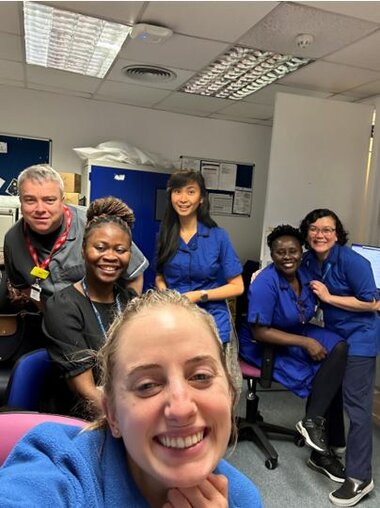3 May 2024
KHP News spoke to nursing staff at the Anticoagulation Clinic in St Thomas' Hospital, to understand how the service being offered can be improved directly from patients. We asked Christina Lim, Clinical Nurse Specialist, to share more about the experience.
Who are you and what do you do?
I am the anticoagulation and thrombosis clinical nurse specialist (CNS) at St Thomas' Hospital. I work together with a team of experienced senior anticoagulation nurses, phlebotomists, senior pharmacists, and consultants.
What is the anti-coagulation service at St Thomas’ Hospital?
We look after patients who are on long-term Vitamin K antagonist (VKA), warfarin and acenocoumarol, for atrial fibrillation (AF), mechanical valve replacement, antiphospholipid syndrome (APS), and thrombosis.
Patients on VKA are required to have their international normalised ratio (INR) blood level checked regularly and dosed accordingly, as out of range high INR level can increase their risk of bleeding and low INR level can increase their risk of further thrombus.
For this they could come to our anticoagulation clinic located at St Thomas’ Hospital, go to their community phlebotomist, self-test at home, arrange a visit from the District Nurse, or by their renal nurse at their dialysis centre.
How have you worked with King’s Health Partners?
The anticoagulation service at St Thomas’ Hospital was interested to hear from our service users - what works well for them and what we can do better to improve their experience. We were fortunate to have the opportunity to work collaboratively with KHP Haematology to conduct a patient's satisfaction survey for our bleed and go patients. We collected over a hundred completed questionnaires in a month. The KHP Haematology programme has helped us analyse the data.
Have you found it useful and what will you do with what you have learnt?
We were grateful to know that our patients highly value our service. They have reported that staff were kind and professional, and that they were satisfied with the communication of result to them.
The survey also highlighted to us that EPIC is still at its infancy stage where patients reported that they were not getting their letter and reminder text about their next appointment. We are collaborating with EPIC IT to streamline the issue. We encouraged all patients to sign up to MYCHART to view their record and follow-up coming appointment. And unavoidably, sometimes our clinic runs late so we need to ensure patients are kept up to date by the nurse in the clinic when that happens.
Why is it important to ask patients about their experience?
We will take onboard all our patients’ comments for service improvement and also to celebrate the good work we are doing. I have enjoyed working with KHP, for their valuable input in making this project a success.





